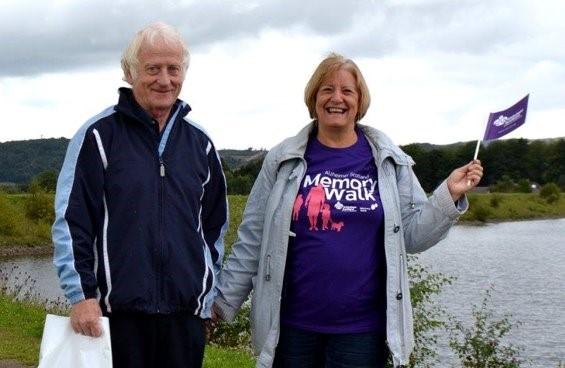Marion’s story
Marion Ritchie shares her experience of having to give up work in order to care for her husband, Dave

Becoming a full time carer
I remember my last day at work – 26 January 2016. I’d clearly been quite stressed that morning, as halfway through my leaving presentation I realised that my blouse was on inside out. I just had to stand and smile and pretend I was fine despite holding back the tears. I felt angry that I had gone back to college and gained new qualifications at 50, and spent the last 13 years developing this training job which I had always wanted and was now having to give up too soon. I looked around at my colleagues and friends and thought how much I was going to miss both them and this job that I loved. I was also anxious at the prospect of become an unpaid carer 24/7 for my husband, Dave who had vascular dementia. I felt that I was giving up my professional life, my self worth and my independence to take on a full time, unpaid carer role that I’d never asked for or wanted. I didn’t know what the years ahead would bring or whether I’d be able to cope. I felt scared and alone.
In my last year, I had tried working part time, but I was too worried that Dave would get lost, or worse still have an accident. I had wanted him to remain as independent as possible so we tried a Buddi system, which allowed me to track his movements on my phone, but it was too distracting to work and want to be checking constantly where he was. It just became easier for me to give up work in the end. I suppose I was lucky to work in local government and be able to change to part time hours, but I didn’t think about the financial toll the years ahead would take with a much reduced income. I had paid into my local government pension scheme, but the rules had changed and the final payment was based on the last three years of employment, and one of mine was now at half pay despite paying in for a lot longer on full pay contributions.
The financial & emotional price of being an unpaid carer
I didn’t really think much about my State Pension either – I couldn’t do anything about it now anyway, and thanks to the change in Government rules for women born after April 1953, I didn’t qualify for it until I was 66. I felt victimised for ‘retiring’ at 63 despite saving the Government millions in care costs. Then to add insult, and despite working from the age of 16, I was invited by HMRC to pay AVCs to get the full State Pension. I was told to apply for Carers Allowance only to receive the insulting amount of £60 per week for a job that no carer can just ‘clock off’ from. Then my husband was admitted to hospital for five months, during this period the Carers Allowance is stopped, and when you eventually do get your State Pension, you are now longer entitled to Carers Allowance. You don’t stop being a carer just because you are now a ‘pensioner’! Your outgoings don’t change, and while he was in hospital I still visited daily, took washing home, helped with meals – and waited for him to be well enough to come home. I spent money from savings adapting our house for his return, but four months later he was back in hospital and then moved permanently to a care home. Yet again the Government ensures that any savings and pensions are taken instantly to pay for nursing care, and no one ever asks if the carer can still manage. If this was any disease other than dementia, nursing care would be classed as health care and free.
This is the financial price of developing dementia, but the emotional price is equally difficult. We faced anticipatory grief together, and I now grieve for the retirement we planned together. Dave didn’t see his daughters’ graduations and won’t meet his grandchildren. I tell myself that I was lucky to have been 63 and not 53 or younger when I became a full time carer. I would not have been able to return to my old job, and finding other work over age 50 is very hard.
Volunteering – a new purpose in life
My working life was over when I walked out the door in January 2016, but volunteering has given me a purpose back in my life and I’m finally finding hobbies to help restore my mental wellbeing too.
I lost Dave at 23.40 on Saturday 15 June 2019 – 20 minutes before Fathers Day, which will always be a really difficult day for my two daughters. Despite how hard life became during the 9 years after his diagnosis, I would be my husband’s unpaid carer again in a heartbeat just to have him here with me again.